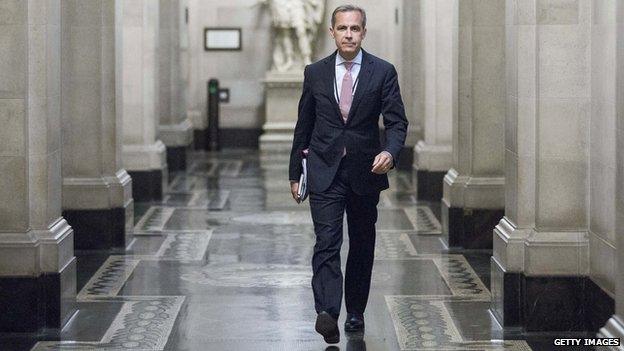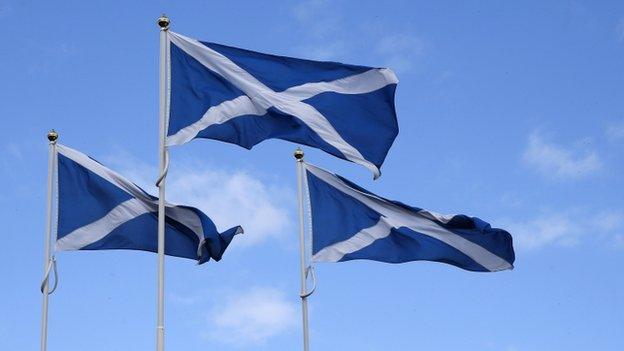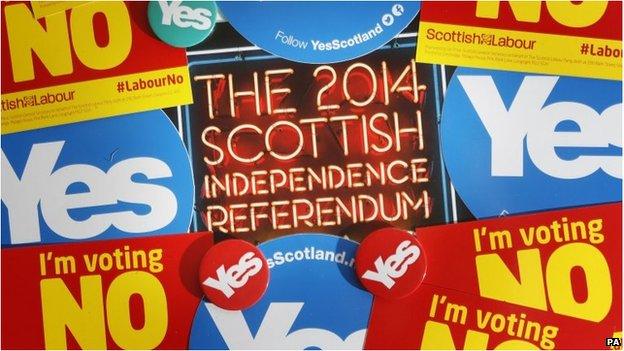Could the Bank of England become a huge Scottish creditor?
- Published
- comments

Mark Carney says that in the period between a vote for independence and Scotland actually becoming an independent nation, the Bank of England will not let any bank get into trouble.
Rather like the Queen, the Governor of the Bank of England does not want to stray into the debate over whether Scotland should opt for independence.
But Mark Carney is not doing quite as good a job of by-standing as Her Majesty.
On Wednesday, when talking to MPs on the Treasury Committee, he weighed into the costs for Scotland of keeping its currency tied to sterling, in the absence of monetary union - which is what many expect would be the monetary arrangements for an independent Scotland, given that the Westminster government and Labour have said no, nay, never to a formal eurozone-style currency union.
What Carney said was a unilateral decision to, in effect, keep the pound - which could be done in a number of ways, including issuing a new currency but fixing its value as equivalent to the pound sterling - would force a Scottish government to accumulate substantial financial reserves.
These would be needed largely so that lenders to Scottish banks could be confident that those banks could be bailed out in a crisis, and creditors would not be at serious risk.
How large would these reserves have to be?
Well, he signalled they would run to tens of billions of pounds, and only a small proportion would be obtained from the rest of the UK, in the break-up negotiations.
Or, to put it another way, building up the needed reserves would reduce the resources of the Scottish government for other things, such as funding public services.
Mr Carney was asked by Andrew Tyrie, chairman of the Treasury Committee, whether these reserves would have to come from tax rises or public spending cuts - and Mr Carney agreed that was likely.
He was therefore suggesting that keeping the pound in this manner would be expensive for Scots.
Savings
Mr Carney also said something else that was unlikely to warm the cockles of Mr Salmond and his fellow campaigners for independence - which is that a number of financial firms domiciled in Scotland may migrate south of the border.
This was an unsurprising statement on the day that David Nish, chief executive of the Scottish money manager Standard Life, confirmed plans to establish England-based companies, into which it would inject clients' pension and investment assets.
Mr Nish has written to customers saying that they will be protected from the risk that the value of their savings could be impaired if an independent Scotland were to impose higher taxes, or adopt a weak currency, or fail to have adequate regulation and compensation schemes.

This protection would be provided by the transfer of the assets to the new English companies so that clients would continue to be subject to the same currency, fiscal and regulatory conditions as at present.
Nish says it would make these transfers for customers who reside outside Scotland.
What it will do to protect Scottish clients is a bit more vague - and Nish says the company will "consider what additional measures we may need to take on their behalf as a consequence of constitutional change once further clarity and certainty is received".
And there is the rub.
There is a good deal the banks and money managers can do to reassure customers who do not live in Scotland - but perhaps less for those who reside north of the border.
So, as I have been saying for some time, on the day after a vote for independence Royal Bank of Scotland would move its headquarters and legal home - its registered office - to London.
And Lloyds would relocate its registered office to where it currently has its head office - which is also London (naturally).
In relocating in this way, RBS and Lloyds would be reassuring their creditors that they would be protected from the risk that the banks would no longer be protected and regulated by the Bank of England.
But RBS and Lloyds cannot give reassurance to Scottish-based savers that their deposits would not fall in value - in the event that Scotland was unable either to keep sterling or link a new currency to the value of sterling.
The risk is that Scotland would ultimately adopt a new currency, which would fall in price relative to the pound.
Here is the one reason why this matters.
'Cheap and easy'
A number of bank bosses have told me they expect significant flight of savings out of Scotland in the event of a vote for independence, because, in the words of a senior bank executive, "the devaluation risk is real".
He added: "It is cheap and easy to move money to English banks so why wouldn't you do it? The lesson of what has happened in countries where there is a risk of devaluation is that savers move their cash".
Although he is not seeing a "momentous" outflow of cash at the moment, he fears this would change the day after a vote for independence.
And as of earlier this week, he has been keeping an eye on balances in his Scottish businesses on a daily basis.

There could, of course, also be flight out of money management groups such as Standard Life - which is why on Wednesday it said it will do the fleeing for its customers, as it were.
This risk of capital flight from an independent Scotland was what the Bank of England governor Mark Carney was describing in his inflation press conference in August, when he said: "uncertainty about the currency arrangements could raise financial stability issues".
On Wednesday, Mr Carney re-confirmed that in the 18 months or so between Scots voting for independence and Scotland actually becoming an independent nation, the Bank will not let any bank get into trouble if they were to suffer a massive outflow of deposits and demands for loans to be repaid.
The Bank would, in its time-honoured fashion, fill any funding gap by providing emergency loans, in its role as lender of last resort.
At risk
But then the question arises of how the Bank of England would get its money back as and when Scotland became independent and it was no longer the official central bank for banks in Scotland.
Mr Tyrie told me on Wednesday that arrangements for repaying the Bank of England would have to be negotiated right at the start of formal talks on separating Scotland between the Westminster government and Alex Salmond.
But there would very likely be a curious state of affairs for some months or even years, whereby Scotland would be a separate nation, but the taxpayers of England, Wales and Northern Ireland would in effect be lending to banks in Scotland to the tune potentially of many billions of pounds.
So, taxpayers south of the border would have a considerable sum at risk.
In the event that Scotland were to adopt a weak currency, banks with significant loans in Scotland would probably be repaid in that weak and falling currency. Which means that if they had borrowed from the Bank of England in harder sterling, a gap might arise between the resources they had available to repay the Bank of England.
These potential risks for the Bank of England represent one of the reasons why Alex Salmond and his colleagues still feel that if the penny were to drop for independence on 18 September, the government in Westminster might then have to re-evaluate the costs and benefits of their seemingly implacable opposition to monetary union.
Though, for what it's worth, I do not see any sign of government, civil service, Labour or Bank of England lessening their opposition to currency union by even a scintilla.